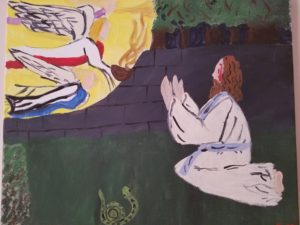The Value of our Prayer: Holy Thursday and Divine Mercy Sunday
I was quite disappointed this last Holy Thursday. Our parish traditionally has adoration until late into the evening, and various parish groups, families, and individuals sign up to spend an hour with the Lord. I didn’t understand the announcement that adoration would be for only one hour this year, and was heartbroken when I arrived for my usual late shift to find the doors locked.
The good thing about this, of course, was that I was heartbroken. It’s nice to be surprised by your own emotional response, and find it is the one you’d hope to have in the situation.
I love the Triduum, but Holy Thursday adoration is especially important to me because of an experience many years ago that’s stuck with me. I’ve shared this story with my family, but realized I’ve not shared it here, and even neglected to journal about it! I’ll remedy that now.
Before I begin, I want to be very clear that I do not pretend to think my reflection on this, or my experience, necessarily means that my interpretation is accurate – it was meaningful to me, and the lesson subjectively true, but there’s plenty of room for error on my part. I’m terrible with time, so I may not have the year right, or even the exact circumstances, or the details of my vision. Disclaimer, disclaimed…
It was Holy Thursday of 2008, I think (my wife says it was 2007). My second Holy Thursday, and my first as a Catholic. I served as an acolyte for the mass, and arrived in the side chapel a few minutes after adoration had begun. The room was full, and a few ladies lead the room in singing the Divine Mercy Chaplet. The lights were dim, and the smell of incense hung heavy in the air.
I knelt on the floor, between the last row of kneelers, and the pew against the back wall, since there were no pews or kneelers available, and sang along.
As I sang, I was transported to the garden, where I saw Jesus, suffering, and alone.
I experienced an intense empathy for his suffering, and was overwhelmingly thankful that he was choosing, in that very moment, to accept the cup of suffering.
I saw our song of thanksgiving and pleas for mercy scooped up, like incense from the boat. The prayers were placed into a bowl, from which they continued to arise like burning incense. The bowl of burning incense was given to an angel, who carried the bowl to Jesus, in the garden. There, the angel presented the sweet savor of our prayers to Jesus, strengthening him in his agony (Luke 22:43).
 My daughter painted the vision for me as a gift a few years ago.
My daughter painted the vision for me as a gift a few years ago.
In that moment, it was suddenly real to me how greatly he treasures our prayers. They are, as the evangelist describes, incense in the hands of the elders in heaven (Revelation 5:8), rising up from the hands of an angel to be offered to God himself (Revelation 8:3-5).
Perhaps the only truth that matters here is that realization of how greatly the Lord treasures our prayers, but my reasoning in retrospect seems to affirm the vision as plausibly representative of reality.
Angels, as I understand it, are created beings, and therefore bound by time, in which all of creation exists. God, however, is not created, and exists both within and beyond time. As St John Paul II declares, “Time… is God’s gift. Continuously created by God, it is in his hands.” (GENERAL AUDIENCE Wednesday, 19 November 1997) I am not suggesting that God can change the past without violating the nature of creation or his nature, but I am suggesting that, perhaps, he can make us, and our prayers, present eternally. This is in alignment with the fact that Jesus is eternally re-presenting his sacrifice to the Father (Romans 8:34) on our behalf, and that the celebration of the Mass is always and everywhere a mystical participation in his singular offering.
Whatever any subsequent theological arguments might determine, this taught me to pray more often, and more heartily, for which I am thankful.
- Is today the day? – Palm Sunday of the Lord’s Passion (A)
- If God Does Not Intervene: Fourth Sunday of Easter (A)
